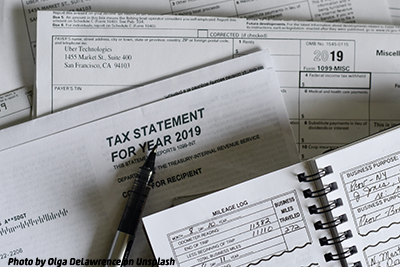
Reminders for ITR filings during the ECQ
By Atty. Rodel C. Unciano
"Early filing and payment will also help us avoid the last-minute rush later on. Indeed, it helps to pay our taxes now without waiting for the extended deadline.."
Were it not due to the Covid19 pandemic, I could imagine that most taxpayers, by now, must have been so busy doing their last minute touches on their Annual Income Tax Returns (ITRs) to beat the original April 15 deadline. For those who, by option or some other reason, still has not commenced the preparation, well the pandemic has, ironically, come to your rescue. The deadline has been extended to May 30.
But despite the extended deadline, the Bureau of Internal Revenue (BIR) encourages taxpayers to file their ITR and pay the tax due thereon without waiting for the extended deadline.
There are, of course, good reasons to comply. Foremost of all, we have to take this as an opportunity for us to help the government in funding the much-needed measures against the effects of Covid19. Early filing and payment will also help us avoid the last-minute rush later on. Indeed, it helps to pay our taxes now without waiting for the extended deadline. Anyway, tax is something that we cannot avoid. It is as certain as death, they say.
The following are few reminders and guidelines in your ITR filings and tax payments during the Enhanced Community Quarantine (ECQ):
 Taxpayers who file their tax returns within the original deadline or prior to the extended deadline can amend their tax returns at any time on or before the extended due date. An amendment that will result to additional tax to be paid shall not be subject to corresponding penalties provided that the same is done not later than the extended deadline as provided under existing rules and regulations.
Taxpayers who file their tax returns within the original deadline or prior to the extended deadline can amend their tax returns at any time on or before the extended due date. An amendment that will result to additional tax to be paid shall not be subject to corresponding penalties provided that the same is done not later than the extended deadline as provided under existing rules and regulations.
A taxpayer whose amended return will result to overpayment of taxes paid, can opt to carry over the overpaid tax as a credit against the tax due in the succeeding period’s tax return. In the alternative, the taxpayer may file a claim for tax refund.
For those paying through the Electronic Filing and Payment System (eFPS) facility, the BIR reminds everyone that the facility automatically computes penalties for the late filing/payment of taxes due. Thus, taxpayers are advised to disregard the penalties computed by the system and pay only the basic tax due, provided that the payment is made on or before the extended deadline.
All Authorized Agent Banks (AABs) shall accept payment of ITRs during the Enhanced Community Quarantine (ECQ) without the imposition of corresponding penalties. Of course, any filing and payment beyond the extended deadline shall be subjected to the applicable penalties from the extended deadline until actually paid.
Taxpayers may file their ITRs using the eBIR Forms/eFPS facility and pay the corresponding taxes using online payment channels such as GCash, PayMaya, LandBank, Development Bank of the Philippines, Visa and Mastercard Credit Card. All AABs are required to accept the payment of manually filed and out-of-district returns from taxpayers enrolled in the eFPS in cases of the unavailability of the eFPS facility.
The AABs are required to accept payments made through checks and/or combination of cash and check(s) in the payment for single tax liability. They are required to accept the tax payments from taxpayers who are already within the bank’s premises by the close of the AAB banking hours.
In cases of any violation committed by the taxpayers in the filing of their tax returns and payments of internal revenue taxes, AABs are not required to impose penalties for such violations. It is the BIR which will be the one to impose whatever appropriate penalty incident to the said violation.
Let’s do our share by paying our correct taxes. Together, we can beat Covid19.
The author is a partner of Du-Baladad and Associates Law Offices (BDB Law), a member-firm of WTS Global.
The article is for general information only and is not intended, nor should be construed as a substitute for tax, legal or financial advice on any specific matter. Applicability of this article to any actual or particular tax or legal issue should be supported therefore by a professional study or advice. If you have any comments or questions concerning the article, you may e-mail the author at This email address is being protected from spambots. You need JavaScript enabled to view it. or call 8403-2001 local 140.




